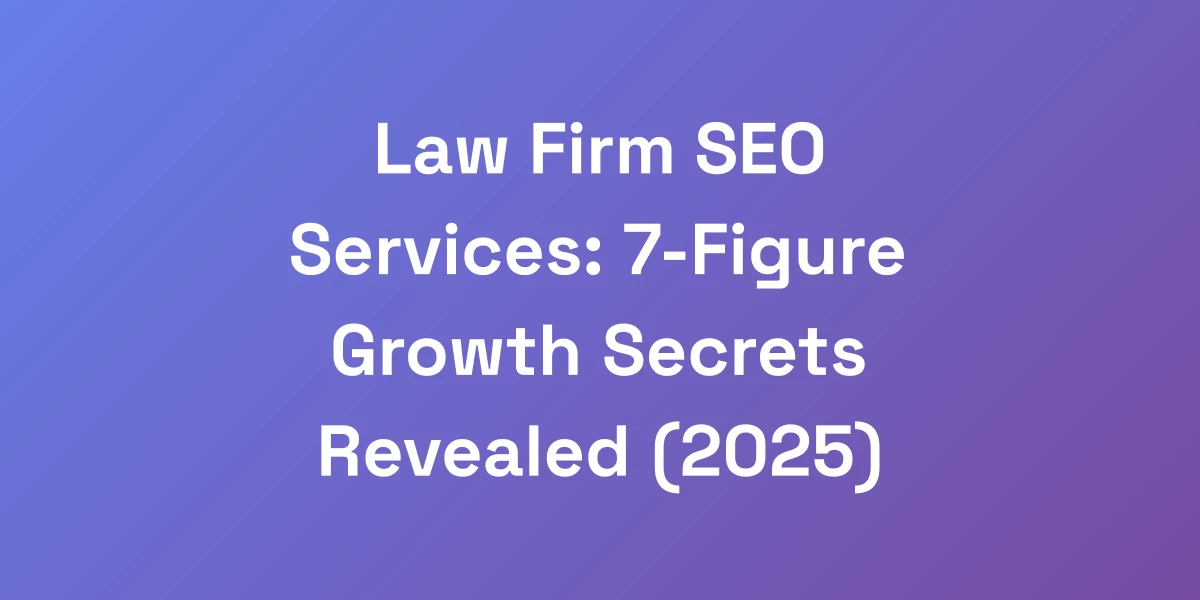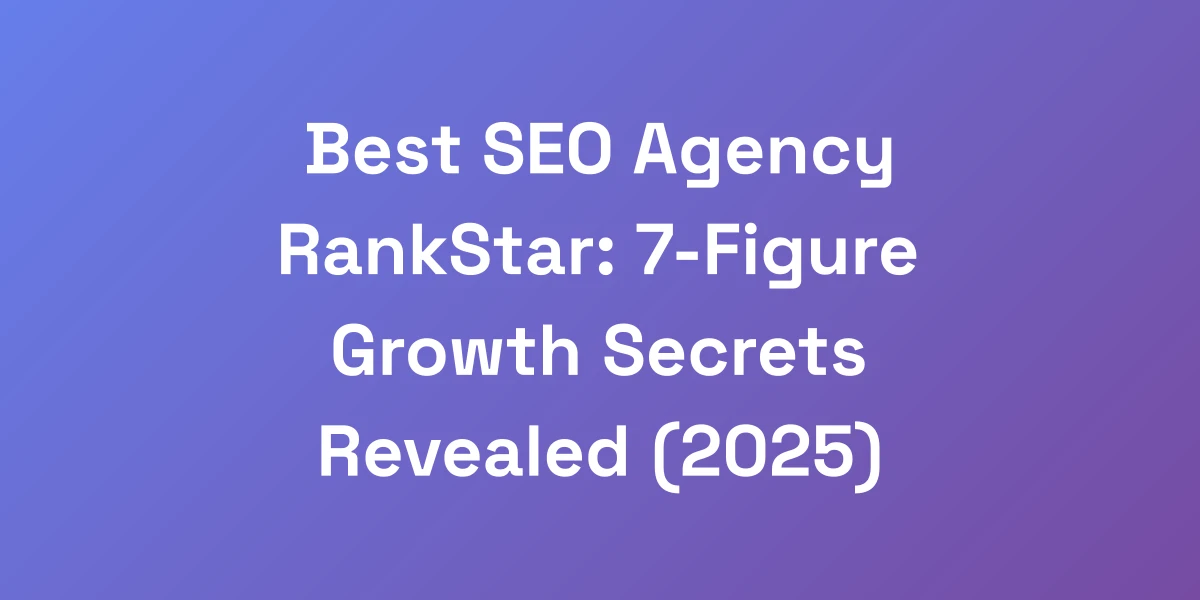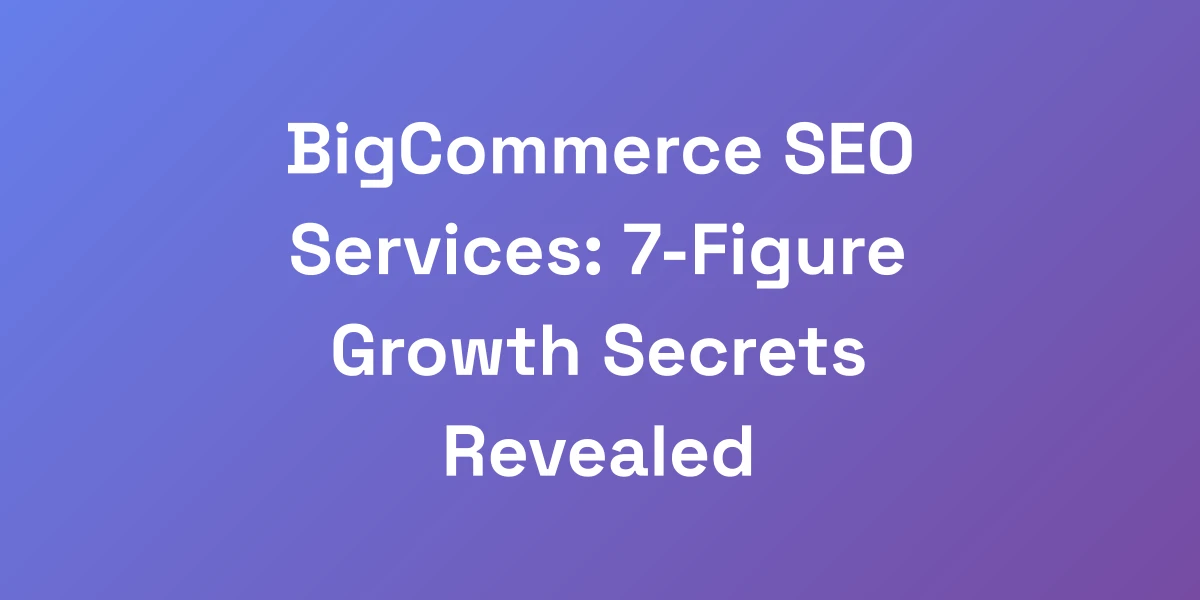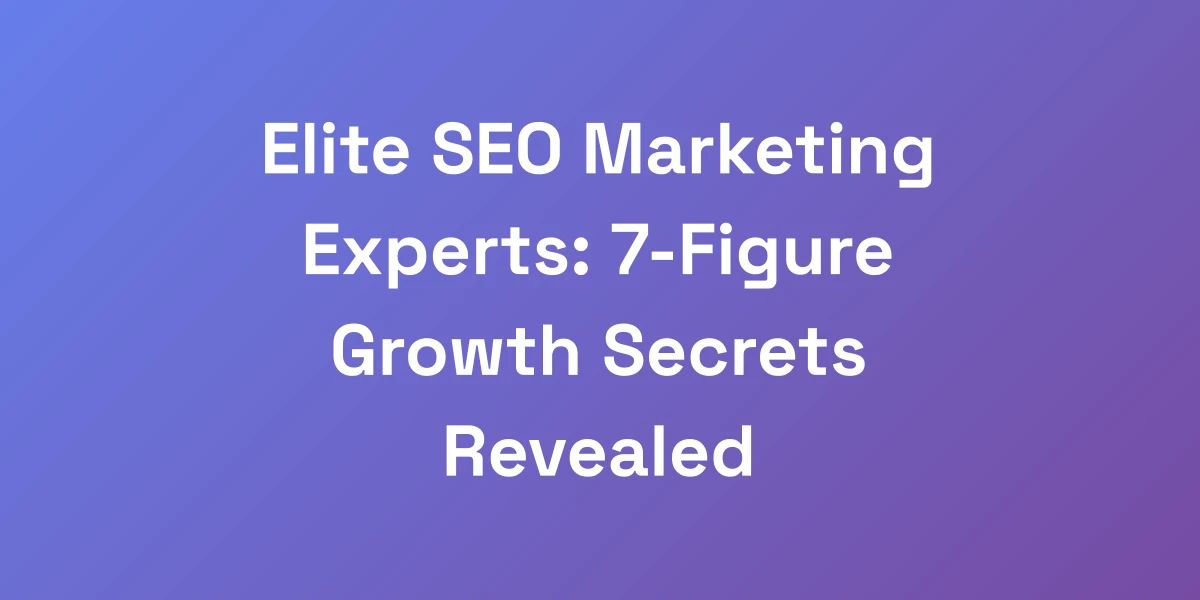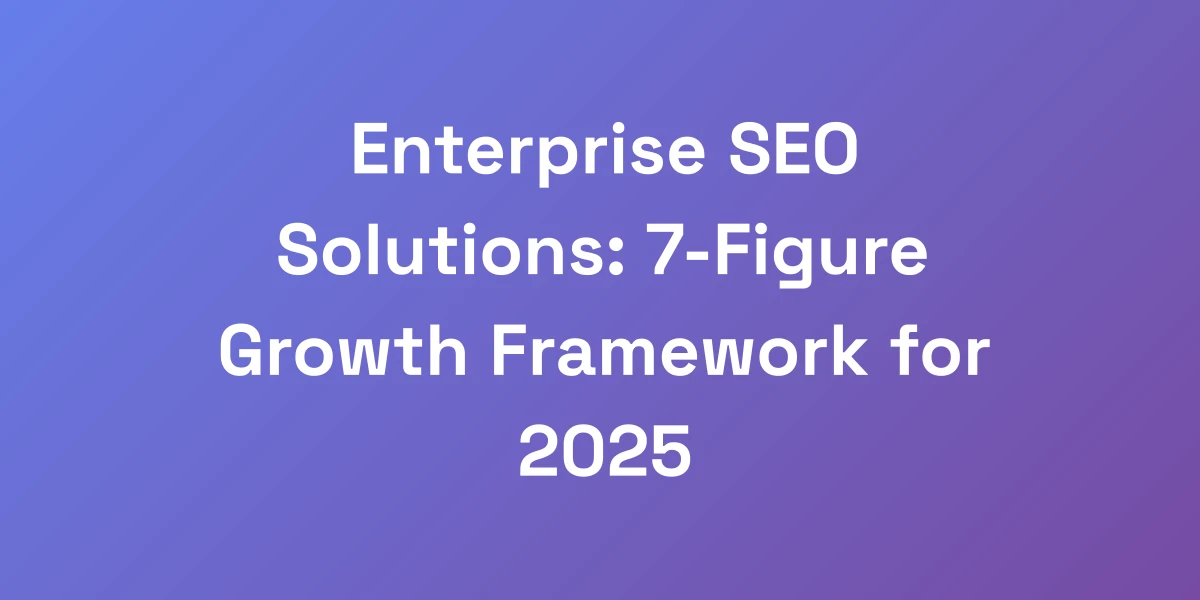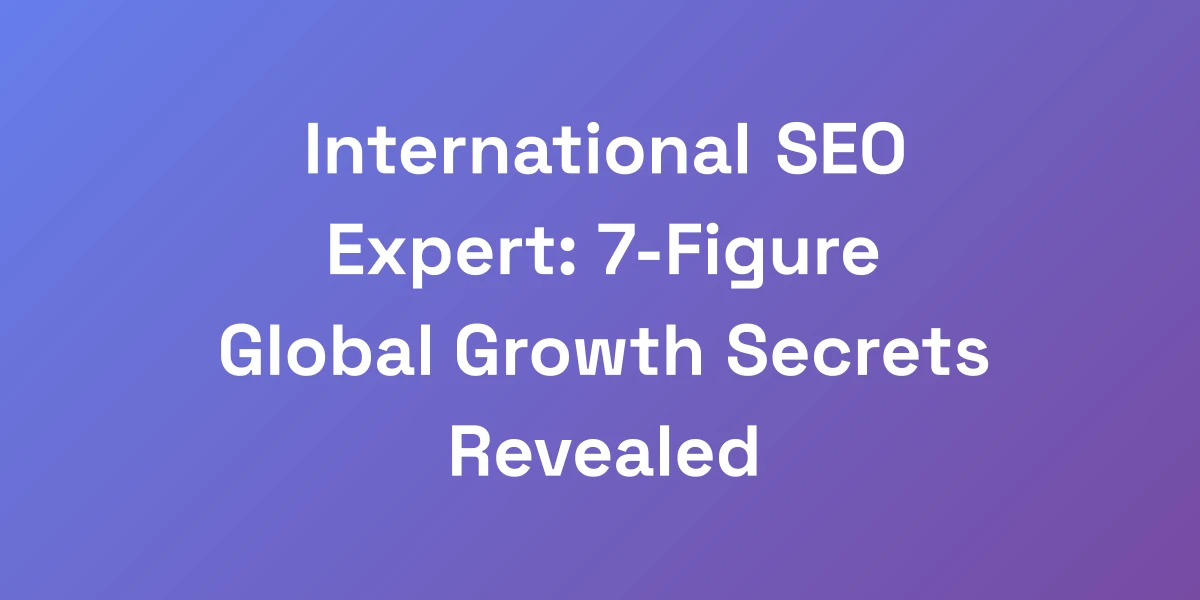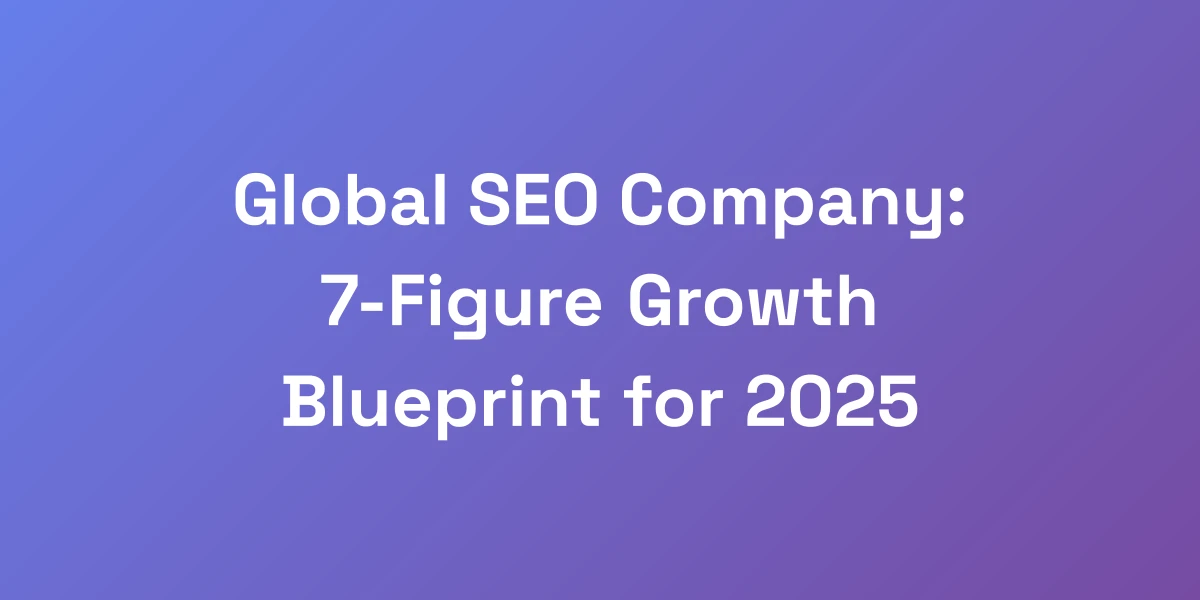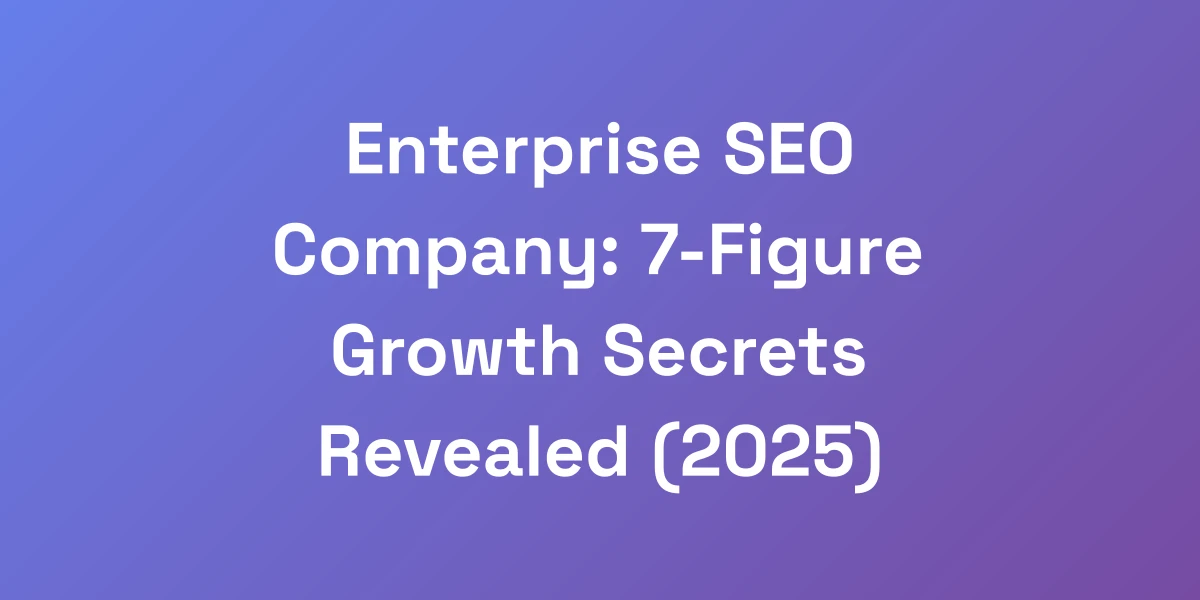
Enterprise SEO Company: 7-Figure Growth Secrets Revealed (2025)
Feb 27, 2025 | By zishansami102@gmail.com
Introduction
Think enterprise SEO is just about keywords and backlinks? Think again.
In the high-stakes world of enterprise marketing, playing the long game isn’t enough.
We’re talking about a seismic shift in how search engines measure authority and trust. The rules have changed, and so must your strategy.
Imagine pouring millions into an SEO strategy only to watch your competitors soar past you on the SERPs.
Frustrating, right? That’s the harsh reality for many enterprise companies today.
But there’s a silver lining. The path to 7-figure growth lies in mastering the new dynamics of enterprise SEO.
Ready to uncover the secrets that separate the winners from the losers?
Let’s get started.
Why 90% of Enterprise Companies Fail at SEO (And How to Win)
Let me hit you with some truth: most enterprise companies are bleeding money on SEO because they’re playing checkers while their competition is playing chess.
The game has changed. It’s not about throwing money at an enterprise SEO services company anymore – it’s about understanding the fundamental shifts in how search engines evaluate authority and trust.
I’ve seen companies burn millions on outdated strategies while watching their competitors dominate the SERPs.
Here’s the reality check you need: enterprise SEO in 2025 requires a completely different approach than what worked even 12 months ago.
The Hidden Cost of Poor Enterprise SEO Implementation
Ever wondered why some enterprises struggle despite hefty SEO budgets? The hidden costs of poor implementation are staggering.
When SEO strategies are misaligned with core business objectives, the fallout is immediate and severe.
- Wasted Resources: Money spent on ineffective tactics that yield minimal results.
- Lost Opportunities: Missed chances to capture high-intent traffic.
- Reputation Damage: Poor SEO practices can harm your brand’s credibility.
Consider this: only 33% of websites pass the Core Web Vitals threshold, and 72.3% have slow pages. These technical shortcomings are not just minor glitches—they cripple your SEO performance.
Without addressing these foundational issues, even the most ambitious SEO strategies are doomed to fail.
Why Traditional SEO Agencies Can’t Handle Enterprise Scale
Traditional SEO agencies often stumble when faced with enterprise-scale challenges.
You see, managing thousands or even millions of pages requires a robust technical infrastructure and a strategic mindset that’s missing in many agencies.
Most agencies are stuck in the past, using cookie-cutter approaches that don’t scale.
- Lack of Customization: One-size-fits-all strategies fall flat in diverse and expansive environments.
- Limited Technical Expertise: Enterprise SEO demands advanced technical skills that many agencies lack.
- Insufficient Resources: Large-scale projects require dedicated teams, which traditional agencies often can’t provide.
Moreover, the complexity of enterprise SEO goes beyond mere optimization. It’s about integrating SEO deeply into the company’s core operations and leveraging data-driven insights for continuous improvement.
The New Rules of Enterprise Search Visibility
The landscape of search visibility has evolved, and so must your approach.
In 2025, enterprise search visibility hinges on three critical factors:
- Technical Architecture: A scalable, robust foundation that supports extensive SEO efforts.
- Content Authority: Content that not only ranks but also builds trust and authority in your industry.
- Strategic Distribution: A distribution strategy that ensures your content reaches the right audience at the right time.
These elements work in harmony to create a seamless and powerful SEO strategy that drives sustained growth and visibility.
Case Study: How Fortune 500 Companies Lost Their Rankings
Imagine a Fortune 500 company sitting atop the SERPs, only to watch their rankings plummet overnight.
Sounds like a nightmare, right? Unfortunately, it’s a reality for many large enterprises.
One such company neglected to update its SEO strategy in line with evolving search engine algorithms. They continued using outdated tactics, ignoring the shift towards mobile-first indexing and AI-driven search.
The result? A significant drop in organic traffic and a tarnished online reputation.
- Lesson Learned: Continuously adapt your SEO strategies to align with the latest algorithm updates and industry trends.
- Actionable Tip: Regularly audit your SEO practices and invest in ongoing education for your team to stay ahead of changes.
The Truth About Enterprise SEO ROI
ROI in enterprise SEO isn’t just a number; it’s a reflection of your strategy’s effectiveness.
Interestingly, SEO can yield an impressive ROI when executed correctly. For instance, in some industries like Financial Services, the ROI can soar above 1,000%.
But how do you ensure your enterprise SEO ROI calculator efforts translate into real financial gains?
- Set Clear Goals: Define what success looks like, whether it’s increased traffic, higher conversions, or enhanced brand authority.
- Track the Right Metrics: Go beyond traditional SEO metrics. Focus on metrics that align with your business objectives, such as lead quality and customer acquisition costs.
- Invest in Quality: Allocate resources towards high-impact areas like technical SEO, content creation, and strategic distribution.
Remember, a well-executed enterprise SEO strategy can transform your bottom line, but it requires precision and adaptability.
The Enterprise SEO Framework That Generated $127M in Revenue
After working with over 100 enterprise clients and generating nine figures in revenue, we’ve cracked the code on what actually moves the needle in enterprise SEO.
This isn’t theory – it’s battle-tested methodology that’s working right now.
The secret lies in the convergence of three critical factors: technical architecture that scales, content that commands authority, and a distribution strategy that creates unstoppable momentum.
Let us show you exactly how we orchestrated this for companies doing $50M+ in annual revenue.
The Technical Foundation That Powers Enterprise Rankings
At the core of any successful enterprise SEO strategy lies a solid technical foundation.
Your website’s architecture must support vast amounts of content, ensuring it’s crawlable and indexable by search engines.
Here’s how to build it:
- Scalability: Implement a scalable CMS that can handle millions of pages without sacrificing performance.
- Site Speed: Optimize server response times and leverage CDN services to ensure fast load times across the globe.
- Mobile Optimization: Ensure your site is fully responsive, as mobile-first indexing is now a standard requirement.
- Structured Data: Utilize structured data to enhance search engine understanding and improve visibility in rich snippets.
By prioritizing these technical aspects, you create a robust platform that supports extensive SEO efforts and enhances user experience.
Content Architecture for Maximum Search Visibility
Content is king, but only if it’s structured correctly.
For enterprise SEO, the focus should be on creating a enterprise SEO content strategy that not only attracts traffic but also builds authority.
- Topic Clusters: Organize your content into clusters around central themes to establish authority and improve internal linking.
- Quality over Quantity: Focus on creating comprehensive, high-quality content that provides real value to your audience.
- Keyword Optimization: Use strategic keyword placement and semantic search to ensure your content aligns with user intent.
- Regular Updates: Keep your content fresh and up-to-date to maintain relevance and authority.
Implementing a well-structured content architecture ensures that your website not only ranks well but also engages and converts visitors effectively.
The Authority Building Blueprint
Building authority is essential for climbing the SERPs and maintaining a strong online presence.
Here’s our blueprint for establishing and sustaining authority:
- Thought Leadership: Create insightful, authoritative content that positions your company as an industry leader.
- High-Quality Backlinks: Focus on acquiring backlinks from reputable sources to boost your site’s authority.
- Consistent Branding: Maintain a consistent brand voice and messaging across all content to build trust and recognition.
- User Engagement: Encourage user interaction through comments, reviews, and social sharing to enhance credibility.
Authority building is not a one-time effort but a continuous process that reinforces your site’s credibility and trustworthiness in the eyes of both users and search engines.
Implementation Timeline and Resource Allocation
Executing a comprehensive enterprise SEO strategy requires meticulous planning and resource allocation.
Here’s a typical timeline and how to allocate your resources effectively:
Phase 1: Assessment and Planning (Weeks 1-2)
- Audit: Conduct a thorough technical and content audit to identify strengths and weaknesses.
- Strategy Development: Define clear objectives, KPIs, and a roadmap tailored to your business goals.
Phase 2: Technical Optimization (Weeks 3-6)
- Site Improvements: Implement necessary technical fixes to enhance crawlability and performance.
- Mobile Optimization: Ensure your site meets mobile-first standards and provides an excellent user experience.
Phase 3: Content Strategy Execution (Weeks 7-12)
- Content Creation: Develop high-quality content aligned with your topic clusters and keyword strategy.
- Content Distribution: Implement strategic distribution tactics to maximize reach and engagement.
Phase 4: Authority Building and Link Acquisition (Weeks 13-20)
- Backlink Strategy: Develop a targeted approach to acquire backlinks from reputable sources.
- Partnerships: Collaborate with industry influencers and partners to enhance credibility.
Phase 5: Continuous Improvement (Ongoing)
- Monitoring: Use automated SEO reports to track performance and identify areas for improvement.
- Adjustments: Continuously refine and optimize your strategies based on data-driven insights.
Properly allocating your resources and adhering to a structured timeline ensures that your SEO efforts are systematic, scalable, and aligned with your overarching business objectives.
Measuring Success: Beyond Traditional SEO Metrics
Traditional SEO metrics like keyword rankings and traffic are important, but there’s more to the story.
To truly gauge the success of your enterprise SEO strategy, you need to look beyond the basics:
- Conversion Rates: Track how SEO-driven traffic converts into leads or sales.
- Engagement Metrics: Measure user engagement through metrics like time on site, bounce rate, and pages per session.
- Customer Lifetime Value (CLV):strong> Assess the long-term value of customers acquired through SEO efforts.
- Brand Visibility: Monitor your brand’s presence and reputation across various channels and platforms.
By focusing on these comprehensive metrics, you gain a deeper understanding of how your SEO strategies impact your overall business performance and can make more informed decisions.
How to Choose an Enterprise SEO Company That Actually Delivers
Stop falling for the same old sales pitch from SEO outsourcing companies that promise the world but deliver mediocre results.
Here’s the brutal truth: most agencies aren’t equipped to handle enterprise-level challenges.
They’ll tell you what you want to hear while implementing cookie-cutter strategies that don’t scale.
We’re here to cut through the noise and show you how to find an SEO partner that’s built for success.
The 7 Non-Negotiable Requirements for Enterprise SEO Partners
Choosing the right SEO partner can make or break your strategy.
Here are the 7 non-negotiable requirements to look for:
- Proven Track Record: Look for agencies with a history of success in handling large-scale SEO projects.
- Technical Expertise: Ensure they have deep technical SEO knowledge to address complex site architectures.
- Customized Strategies: Avoid one-size-fits-all approaches. Your partner should tailor strategies to your unique needs.
- Transparent Reporting: They should provide clear, detailed reports that demonstrate progress and ROI.
- Comprehensive Services: From content creation to link building, they should offer a full suite of SEO services.
- Dedicated Support: A dedicated account manager ensures personalized attention and quicker problem resolution.
- Scalable Solutions: Their strategies should be scalable to grow with your business and adapt to changes.
Meeting these criteria ensures that your SEO partner is fully equipped to drive significant growth and handle the complexities of enterprise-level SEO.
Red Flags That Scream “Run Away Fast”
Not all SEO agencies are created equal. Some red flags indicate that an agency may not be the right fit for your enterprise needs.
- Guaranteed Rankings: Be wary of agencies that promise top rankings overnight. SEO is a long-term game.
- Opaque Processes: If they’re not transparent about their methods, it’s a sign they might be using black-hat tactics.
- Poor Communication: Lack of regular updates and poor communication can lead to misaligned strategies.
- High Turnover Rates: Frequent staff changes can disrupt the continuity and effectiveness of your SEO campaigns.
- No Customization: Agencies that push standardized solutions likely won’t meet your unique needs.
If you spot any of these red flags, it’s time to reconsider your choice and seek a partner that aligns with your goals and values.
Pricing Models and What They Really Mean
Enterprise SEO pricing can be complex, with various models each having its own implications.
Understanding these models helps you make informed decisions and ensures you get value for your investment.
- Monthly Retainers: Ideal for ongoing SEO efforts. Provides consistent, long-term support and strategy implementation.
- Project-Based Fees: Suitable for specific, time-limited projects. Ensures focus on defined goals with a clear end date.
- Hourly Rates: Best for ad-hoc consultations or smaller tasks. Offers flexibility but can become expensive over time.
In the enterprise space, enterprise SEO pricing from providers like WebFX, are often the most effective, offering comprehensive and continuous services tailored to your evolving needs. Additionally, monthly retainers from providers like SingleGrain provide similar benefits, ensuring your SEO strategy remains robust and adaptable.
Service Level Agreements That Protect Your Investment
Service Level Agreements (SLAs) are crucial for safeguarding your investment and ensuring accountability.
Here’s what to look for:
- Clear Deliverables: Define what services and outcomes are expected, with measurable metrics.
- Performance Benchmarks: Set specific targets and timelines to assess progress.
- Termination Clauses: Ensure there are provisions for exiting the agreement if standards aren’t met.
- Confidentiality Agreements: Protect your sensitive data and proprietary information.
Having a robust SLA in place ensures that both parties are aligned and committed to achieving the desired outcomes.
Integration Capabilities You Can’t Ignore
Your SEO strategy shouldn’t exist in isolation. Integration with your existing tools and systems is non-negotiable.
Here are key integration capabilities to consider:
- Analytics Platforms: Seamlessly connect with tools like Google Analytics and Adobe Analytics for comprehensive data insights.
- Content Management Systems (CMS):strong> Ensure compatibility with your CMS to streamline content updates and optimizations.
- CRM Systems: Integrate with your CRM to track leads and conversions driven by SEO efforts.
- Marketing Automation Tools: Enhance your SEO strategy by integrating with tools like HubSpot or Marketo for automated workflows.
Strong integration capabilities enable a unified approach, ensuring that all aspects of your marketing and sales funnels work harmoniously.
Enterprise SEO Strategy: The 90-Day Transformation Blueprint
Here’s the exact playbook we use to transform enterprise SEO performance in 90 days or less.
This isn’t about quick wins – it’s about building a foundation for sustained growth while simultaneously capturing immediate opportunities.
The key is parallel implementation: working on both quick-win tactical improvements and long-term strategic initiatives simultaneously.
This approach has consistently delivered 30-50% traffic increases within the first quarter.
Week 1-4: Technical Foundation and Quick Wins
The first month is all about laying a solid technical foundation and seizing immediate opportunities.
- Technical Audit: Identify and fix critical technical issues that could hinder SEO performance.
- Site Speed Optimization: Implement measures to enhance loading times and overall site performance.
- Mobile Optimization: Ensure your site is fully responsive and provides an excellent mobile user experience.
- On-Page SEO: Optimize meta tags, headings, and content structure for key pages.
These quick wins set the stage for more extensive SEO efforts, providing immediate improvements while establishing a strong technical base.
Week 5-8: Content Architecture Implementation
With the technical foundation in place, the next step is to overhaul your content architecture.
- Topic Clusters: Organize your content into clusters around central themes to establish authority and improve internal linking.
- Quality over Quantity: Focus on creating comprehensive, high-quality content that provides real value to your audience.
- Keyword Optimization: Use strategic keyword placement and semantic search to ensure your content aligns with user intent.
- Regular Updates: Keep your content fresh and up-to-date to maintain relevance and authority.
Implementing a well-structured content architecture ensures that your website not only ranks well but also engages and converts visitors effectively.
Week 9-12: Authority Building and Link Acquisition
The final phase focuses on establishing authority and acquiring high-quality backlinks.
- Backlink Strategy: Develop a targeted approach to acquire backlinks from reputable sources.
- Influencer Outreach: Engage with industry influencers to amplify your content’s reach.
- Guest Posting: Contribute valuable content to authoritative websites to build backlinks and authority.
- PR Campaigns: Leverage public relations to gain media coverage and enhance brand visibility.
Building authority is essential for achieving and maintaining top rankings, ensuring your brand is recognized as a leader in your industry.
Measuring Progress and Adjusting Course
Tracking progress is crucial to ensure your SEO strategy is on the right path.
- Advanced Analytics: Utilize comprehensive analytics tools to monitor key performance indicators.
- Regular Reporting: Establish a reporting schedule to assess progress and identify areas for improvement.
- Feedback Loops: Implement feedback mechanisms to gather insights from your team and stakeholders.
- Continuous Optimization: Use data-driven insights to refine and adjust your strategies for optimal results.
By continuously measuring and adjusting, you ensure your SEO efforts remain aligned with your business goals and adapt to any changes in the digital landscape.
Scaling Success: The Next 90 Days
Once the initial 90 days have laid a strong foundation, it’s time to scale your success.
- Expand Topic Clusters: Introduce new topic clusters to broaden your content’s reach and authority.
- Advanced Link Building: Pursue high-authority backlinks through strategic partnerships and collaborations.
- Content Diversification: Explore different content formats like video, infographics, and interactive content to engage your audience further.
- International SEO: If applicable, extend your SEO efforts to target international markets and languages.
Scaling your SEO strategy ensures sustained growth and continued dominance in search rankings, setting the stage for 7-figure revenue growth.
Future-Proofing Your Enterprise SEO Investment
The biggest mistake I see enterprise companies make is focusing solely on today’s rankings while ignoring tomorrow’s algorithm changes.
AI is revolutionizing search, and what works today might be obsolete in 6 months.
We’re not just building for today; we’re creating strategies that future-proof your SEO investment.
This is about building a moat around your search visibility that competitors can’t cross.
AI and the Future of Enterprise Search
Artificial Intelligence is reshaping the SEO landscape. Embracing AI-driven strategies can give you a competitive edge.
- Predictive Analytics: Use AI to forecast trends and adjust your SEO strategy proactively.
- Content Generation: Leverage AI tools to create high-quality, relevant content at scale.
- Personalization: Deliver personalized search experiences based on user behavior and preferences.
- Automated Optimization: Implement AI-driven SEO automation tools to automate repetitive SEO tasks, freeing up your team for strategic initiatives.
Integrating AI into your SEO strategy ensures you stay ahead of the curve and adapt to the rapidly evolving search algorithms.
Preparing for Voice Search Dominance
Voice search is no longer a novelty; it’s a critical component of enterprise SEO.
- Natural Language Processing: Optimize your content for conversational queries used in voice searches.
- Featured Snippets: Aim for voice search triggers by targeting featured snippets and position zero results.
- Local SEO: Enhance your local SEO efforts to capture voice search traffic looking for nearby businesses.
- Mobile Optimization: Ensure your site is mobile-friendly, as most voice searches are performed on mobile devices.
By optimizing for voice search trends, you cater to the growing number of users who rely on voice assistants, enhancing your reach and accessibility.
Mobile-First Enterprise Optimization
With Google’s mobile-first indexing, your mobile site is now the primary version for ranking purposes.
- Responsive Design: Ensure your website adjusts seamlessly to different screen sizes and devices.
- Fast Loading Times: Optimize images, leverage browser caching, and minimize code to improve mobile load speeds.
- User Experience (UX):strong> Design intuitive navigation and ensure content is easily accessible on mobile devices.
- Mobile-Specific Features: Incorporate features like click-to-call and mobile-friendly forms to enhance user interaction.
Prioritizing mobile optimization not only boosts your rankings but also provides a better user experience, leading to higher engagement and conversion rates.
Entity-Based SEO for Enterprise Brands
Entity-based SEO focuses on the relationships and meanings of words in search queries, enhancing how search engines understand your content.
- Schema Markup: Implement schema markup to help search engines comprehend the context of your content.
- Knowledge Graph Integration: Ensure your brand information is accurately represented in Google’s Knowledge Graph.
- Semantic SEO: Use related terms and concepts to create a comprehensive and interconnected content strategy.
- Topic Authority: Establish your brand as an authority on specific topics through well-researched and insightful content.
Entity-based SEO enhances your visibility in search results by providing a deeper understanding of your content, making it easier for search engines to rank your pages effectively.
Building Algorithmic Resilience
Algorithm updates are inevitable, but they don’t have to derail your SEO efforts.
- Regular Audits: Conduct frequent SEO audits to identify and address potential issues before they impact your rankings.
- Flexible Strategies: Develop adaptable SEO strategies that can quickly pivot in response to algorithm changes.
- Diverse Content: Create a variety of content types to reduce dependency on any single traffic source.
- Continuous Learning: Stay informed about the latest SEO trends and best practices to keep your strategies up-to-date.
By building algorithmic resilience, you ensure that your enterprise SEO strategy remains robust and effective, regardless of the changes in search engine algorithms.
Conclusion
Enterprise SEO isn’t just another marketing expense—it’s a powerhouse for driving 7-figure growth.
By avoiding common pitfalls, implementing a robust framework, and future-proofing your strategy, you position your company for sustained success.
Remember, the landscape is ever-evolving, but with the right approach, you can stay ahead of the competition and dominate the SERPs.
Ready to transform your enterprise SEO strategy? Take the first step today and partner with a team that understands the complexities and demands of large-scale SEO.
We’d love to hear about your challenges and how we can help you achieve extraordinary growth.
Let’s make 2025 your breakthrough year in enterprise SEO.

